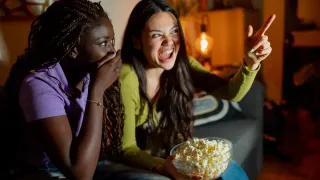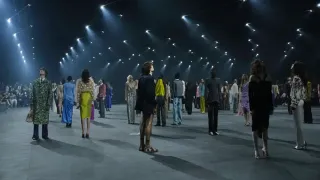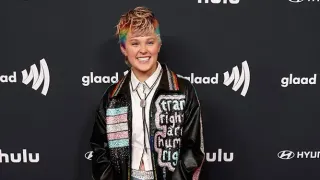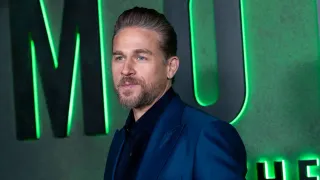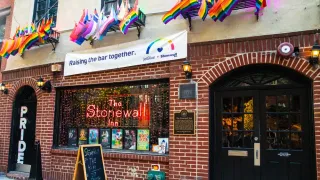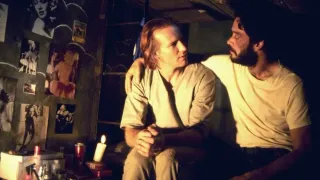November 8, 2014
'The Way he Looks' Director Daniel Ribeiro Talks Gay Movie
Kilian Melloy READ TIME: 5 MIN.
Bay Area queer film fans got a peek at the work of a daring young LGBT director in 2010. Writer/director Daniel Ribeiro is a young artist from a huge country, Brazil, that is in its own way as exceptional as the US. His short "Eu Nao Quero Voltar Sozinho" plops us down inside the complicated world of a young blind teen who feels he's being smothered by an overprotective mom. The feature-length version, opening Friday at Landmark Theatres in San Francisco and Berkeley, preserves the short's unique vision while providing fascinating clues about how our senses shape and inform our sexuality.
"The Way He Looks" opens on two best friends lying lazily by a pool. Leo (Ghilherme Lobo) is bright, handsome and blind from birth. Giovana (Tess Amorim) is Leo's guide and platonic girlfriend. Writer/director Ribeiro's sassy-smart script kicks off with a private chat between these two sweet, naive kids just before a seismic event, a new boy in class, threatens their friendship. Lying on her stomach baking in the sun, Giovana teases the blind boy, who in the course of their conversation becomes agitated and leaps into the pool.
"Will you spend the rest of your life without ever kissing anyone, Leo? You won't change that by listening to Beethoven your entire vacation! You should kiss any girl, and get it over with!"
"Why I don't I kiss you, then?"
Things get sticky when the new boy, the radiant, curly-haired Gabriel (Fabio Audi), becomes a classmate, then replaces Giovana as Leo's best bud. A highlight is an erotic post-pool shower scene between the boys. Director Ribeiro seamlessly charts the baby steps by which new alliances are formed among school chums, and how puberty can drastically up-end old bonds. This may be the first feature to trace with humor and compassion how hard it is to be gay, blind and in love with a boy you've never actually seen.
The film also describes how a childhood playmate can recover from bruised feelings and forge a more mature relationship with a friend who's changing so quickly his whole personality appears to be on roller skates. Midway through the story, Giovana stifles her hurt feelings and protects Leo from an especially mean party prank. A smartass blond boy uses a game of spin-the-bottle to inflict a unique humiliation on the blind kid, maneuvering Leo to the brink of kissing a dog at a party, an actual canine. (By the way, in "The Way He Looks," even the mean-boy bullies are cute as hell.)
In June 2014, filmmaker Daniel Ribeiro, boyishly handsome at 32, arrived at my Market Street flat to describe the special world he and his actors (the same cast from the short) created in The Way He Looks.
David Lamble: What's the title of your 2010 short?
Daniel Ribeiro: "I Don't Want to Go Back Alone." I didn't come here with that film, but I did come in 2008 with a short about 20-something boyfriends planning on moving in together. Then the parents of one of them dies, and he has to start taking care of his 10-year-old brother. So they become a new family, a gay couple raising a 10-year-old.
And the couple breaks up in the end.
It's very open because they decide to take a honeymoon trip, and in the end one of the guys goes by himself. I don't think they break up. I always tell people, "If you're a romantic, you'll think they'll be together. If you're not, you'll think they'll break up."
Then I did [the short] "I Don't Want to Go Back Alone," which is almost the same story as "The Way He Looks". Ghilherme, the actor who plays the blind kid, was very young when we shot, 14 or 15, and he grew a little bit but not so much that we couldn't keep him in the feature. The amount that he grew was good because I could adapt the story to a little bit of an advanced stage. We have the sexuality, we see more of the things when you're a bit older, 16 or 17.
That's when sexuality presses in on you hard. You have a good supporting cast: the blonde bully kid, he's very sexy, impudent, a lot of fun. Even your background cast is alive, intelligent, provocative and sexy.
To me, casting is very important, so we took a long time to find the cast. And the most important thing is chemistry, so we did a test with all of them together where we switched the background cast around. This is important because sometimes you have a great actor who just doesn't fit into the cast, so it doesn't work. The 2010 short was so popular in Brazil that when we were casting the extras, we created a Facebook page and asked, "Who wants to be in the [feature] film?" So the kids in the film's school are fans from the short. If you watch carefully you can see that they match very well, and have personal stories that went beyond what we see in the film.
I particularly like that the film opens with a boy and a girl by a pool, which adds to the ambiguity of their relationship, because they're half-naked, so you don't know who they'll turn out to be. Where was it shot?
In Sao Paulo, but it's not the Sao Paulo that we usually see in movies, a chaotic city with big buildings. It's an ugly city, it's 12 million people, the biggest city in Brazil and South America.
Everything was built yesterday.
Yes, I wanted to make a film that was very universal in a way, so the locations we picked are very bland and suburban.
Finally, how has the environment for gays in Brazil changed in recent years?
It's become more visible. Beginning in the 90s, TV and films have played a large role in that increasing visibility. We have been influenced by American television, also by our own soap operas, which have gay characters. Teenagers grow up now knowing it's a natural thing. It's not easy, like everybody's open, but it's not impossible.
I was a teenager in the 90s, and for me it was very hard. I remember [the British film] "Beautiful Thing" [1996, written by Jonathan Harvey, based on his play], a film that was very important to me because I was the age of the characters [two adolescent boys who are romantically involved while living in a English housing project]. I remember a TV soap opera with two young gay characters who were viewed as friends from the beginning, so everybody liked them by the time the show's writer had them come out. Now you go to schools and there are a lot more gay teens who are comfortable with the way they look and dress. So kids today, especially in Sao Paulo, but perhaps even in the north of the country, have far more things to support them coming out.
